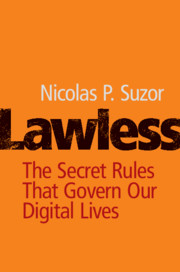Book contents
- Lawless
- Lawless
- Copyright page
- Contents
- Acknowledgments
- Part I A Lawless Internet
- Part II A New Social Contract – Constitutionalizing Internet Governance
- 8 Constitutionalizing Internet Governance
- 9 Protecting Fundamental Rights
- 10 What Should We Expect of Intermediaries?
- 11 The Role of States and Binding Law
- 12 Conclusion
- Notes
- Index
9 - Protecting Fundamental Rights
from Part II - A New Social Contract – Constitutionalizing Internet Governance
Published online by Cambridge University Press: 22 June 2019
- Lawless
- Lawless
- Copyright page
- Contents
- Acknowledgments
- Part I A Lawless Internet
- Part II A New Social Contract – Constitutionalizing Internet Governance
- 8 Constitutionalizing Internet Governance
- 9 Protecting Fundamental Rights
- 10 What Should We Expect of Intermediaries?
- 11 The Role of States and Binding Law
- 12 Conclusion
- Notes
- Index
Summary
Because technology companies play such a large role in governing our lives, we should expect them to constitutionalize their processes for making decisions that affect our fundamental rights. By constitutionalization, I mean particularly the introduction of limits imposed by companies on their own exercise of power.2 This process of constitutionalization is the transformation of political limits that have historically only applied to governments to apply to a decentralized environment where many different types of actors can be said to play a governing role in society.3 This is the translation of the concept of the rule of law to formalize the “lawless” internal processes of powerful corporations in a way that limits and regulates how power is exercised. This translation is a shift away from purely legal conceptions of the rule of law that is essential to pursue if the core goal of the rule of law – limiting the arbitrary exercise of power – is to be achieved in the messy social systems of real life where governments are not the only bodies that regulate our lives.4
Keywords
- Type
- Chapter
- Information
- LawlessThe Secret Rules That Govern Our Digital Lives, pp. 115 - 127Publisher: Cambridge University PressPrint publication year: 2019

